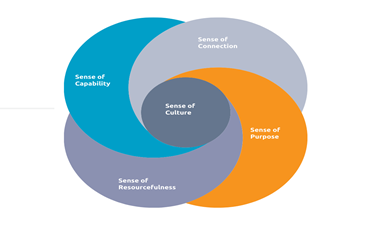Peer Support
Peer Support is a great alternative way to learn from your fellow students as well as meet more people from your programme.
What is Peer Support?
Peer Support is the means by which peers and colleagues can provide guidance and support to each other. Peer Support Leaders and participants can both benefit from the process as meaningful connections are built, feelings of inclusion increase and thus wellbeing is impacted positively. The idea of Peer Support is to foster feelings of belonging, partnership and community for all involved.

Why Have Peer Support?
Here at the R(D)SVS, we recognise the importance of enhanced peer support skills and emotional intelligence within the veterinary profession. With these skills we can create a stronger, safer, more caring/connected community, and protect the mental health of ourselves and others.
To help support our students’ personal and professional development, we offer an optional peer support training course to all of our students. The course is 18 hours long, over nine 2-hour experiential sessions; it involves a considerable amount of guided one-to-one listening practice, alongside group discussion/exercises. Participants can expect to gain listening/support/communication skills that they will carry with them throughout their studies, their work and beyond. Past participants have reported an increase in their communication confidence both on and off campus, as well as a greater sense of community. Feedback also suggested an increased awareness of the participants’ own emotional landscape and health, and how best to support it.
The experience itself often provides a source of comfort and support; many participants are new to the vet school and new to the UK, and the course offers an opportunity to get to know a few caring people on a deeper level. Lasting friendships are sometimes formed! Topics such as suicide awareness/prevention, coping mechanisms, boundaries and referrals are covered, with an emphasis always placed on safety and self-care.
How Will Peer Support Work at RDSVS?
The nine sessions are delivered once weekly in the evening (over two semesters), in a hybrid format: 5 out of the 9 sessions are face-to-face. An invitation to join the course usually goes out to the student body around the start of October each year.
The course was first delivered in 2012, and is run by one of our own staff members, Dr. Stacy Spielman; it is based on the training manual developed by Dr. Anne Ford at Oxford University.
There is no formal Peer Support programme to join at the end of the course, therefore the course is designed for personal development.
The following topics are covered on the course:
- Getting to know a stranger
- Effective questioning
- Welcoming and non-welcoming behaviours
- Identifying and labelling feelings
- Types of questions
- Sharing a concern
- Advice-giving vs. active listening
- Decision making
- Family concerns
- Cultural awareness and stereotypes
- Values clarification
Further information
Contact Stacy Spielman for further details


